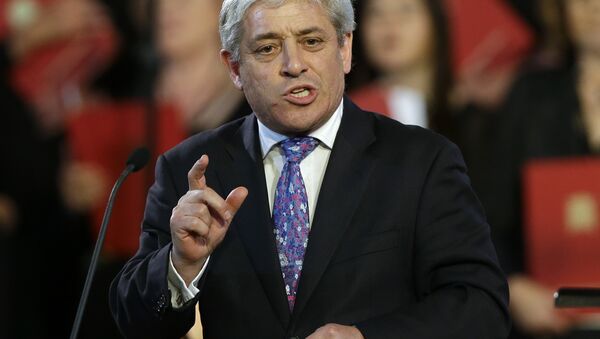According to Prime Minister Boris Johnson's senior adviser Dominic Cummings, Britain will leave the EU without delay, urging “reporters to get outside London” and speak to people other than the “rich remainers”.
The comments arrived shortly after UK lawmakers again turned down Boris Johnson’s calls for an early election, as well as adopted a new Brexit delay law ushering in a five-week suspension of Parliament earlier consented to by the Queen.
Overall, 293 MPs backed the prime minister’s move to end the ongoing Brexit deadlock in an October poll that fell short of the number required to fulfil the proposal. Parliament was ultimately prorogued just before 01:00 GMT on Tuesday and will reopen on 14 October, with the move thereby ruling out another chance of an early election vote and delaying the possible poll until at least November.
Commons’ Bercow Steps Down
In response, Labour backbenchers held up signs reading “Silenced” as Commons Speaker John Bercow announced the Parliament suspension, just hours after he himself voiced his intention to step down from the position he has held for the past 10 years. In the event of no early vote, Bercow, who had earlier been at the centre of a few raucous mistreatment and abuse scandals in the Commons, said 31 October would be the “least disruptive and most democratic” date.
Separately, some Brexiteers questioned his impartiality on the issue of Europe and claimed he had assisted MPs opposed to a no-deal EU divorce so that they could take over control of the Commons.
Bercow, for his part, responded that he had made the decision to quit during the 2017 vote, adding “an experienced figure” should chair the debates leading up to the UK’s probable exit from the European bloc.
Calls for Gov’t Communications Details to Be Revealed
Ahead of the five-week-long parliamentary vacation, MPs backed calls, by 311 votes to 302, for the publication of government communications relating to the suspension of Parliament and no-deal Brexit plans, known as Operation Yellowhammer, with former Tory and now independent MP Dominic Grieve, who tabled the motion telling the lawmakers it was “entirely reasonable” to demand such disclosures. However, Minister Michael Gove, who is responsible for no-deal preparations, said he had hopefully given “sufficient” evidence to the EU select committee on Yellowhammer.
What Awaits Brexit Starting Mid-October
While the period between 14 October to 31 October is likely to be stormy indeed, Prime Minister Boris Johnson said he would not request another Brexit delay, ascertaining that the UK must by all means depart from the EU exactly on Halloween, the deadline he originally voiced. Nevertheless, unless he negotiates a new deal that the Parliament will find more or less acceptable, he will be legally obliged to seek a delay until 31 January 2020 under the terms of the anti-no-deal legislation passed by MPs and that gained Royal Assent on Monday.
Speculation has been running high that Johnson could resign or force a vote of confidence, which in the case of his failure, would trigger 14 days of negotiations over forming a new government. UK Foreign Minister Dominic Raab later hit back on Monday assuring that the British government “will always respect the rule of law”.
Per the premier, the government would use the time the Parliament is suspended to focus all efforts on resumed negotiations with the EU, while still “preparing to leave without a deal”. "No matter how many devices this Parliament invents to tie my hands, I will strive to get an agreement in the national interest”, he said adding the government won’t further prolong the Brexit dead-end.
Earlier on Monday, Johnson held negotiations with Leo Varadkar in Dublin for the first time since he entered No. 10 Downing Street, as the Irish border has been a major stumbling block in attempts to agree a Brexit deal between the UK and the EU. During the meeting, Johnson notably branded the no-deal option as “a failure of statecraft” for both the British and Irish government.
The Brexit talks took a new twist last week when UK lawmakers demanded that they take full control of the government’s agenda. Although Johnson threatened with a snap election, the vote for it has twice not garnered a majority. The Parliament even witnessed a change in composition as the Tories lost their majority following Tory rebel Phillip Lee’s defection to the Lib Dems .


